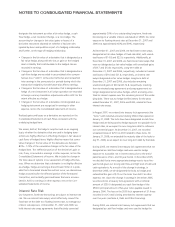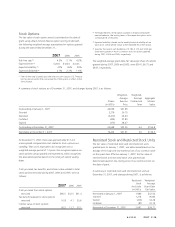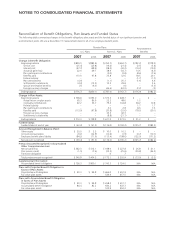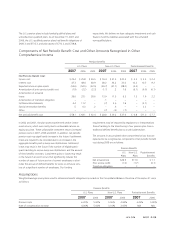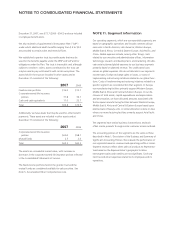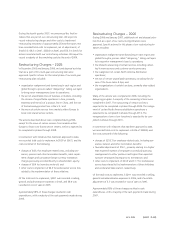Avon 2007 Annual Report Download - page 77
Download and view the complete annual report
Please find page 77 of the 2007 Avon annual report below. You can navigate through the pages in the report by either clicking on the pages listed below, or by using the keyword search tool below to find specific information within the annual report.
Pension trust assets are invested so as to achieve a return on
investment, based on levels of liquidity and investment risk that
is prudent and reasonable as circumstances change from time to
time. While we recognize the importance of the preservation of
capital, we also adhere to the theory of capital market pricing
which maintains that varying degrees of investment risk should
be rewarded with compensating returns. Consequently, prudent
risk-taking is justifiable.
The asset allocation decision includes consideration of the
non-investment aspects of the Avon Products, Inc. Personal
Retirement Account Plan, including future retirements,
lump-sum elections, growth in the number of participants,
company contributions, and cash flow. These actual character-
istics of the plan place certain demands upon the level, risk, and
required growth of trust assets. We regularly conduct analyses of
the plan’s current and likely future financial status by forecasting
assets, liabilities, benefits and company contributions over time.
In so doing, the impact of alternative investment policies upon
the plan’s financial status is measured and an asset mix which
balances asset returns and risk is selected.
Our decision with regard to asset mix is reviewed periodically.
Asset mix guidelines include target allocations and permissible
ranges for each asset category. Assets are monitored on an
ongoing basis and rebalanced as required to maintain an asset
mix within the permissible ranges. The guidelines will change
from time to time, based on an ongoing evaluation of the plan’s
tolerance of investment risk.
Cash flows
We expect to contribute up to approximately $9 and $23 to our
U.S. and non-U.S. pension plans, respectively, in 2008.
Total benefit payments expected to be paid from the plans are as
follows:
Pension Benefits
Postretirement
Benefits
U.S.
Plans
Non-U.S.
Plans Total
Gross
Payments
Federal
Subsidy
2008 $ 81.2 $ 41.2 $122.4 $12.1 $ 1.8
2009 84.6 38.5 123.1 12.1 1.9
2010 83.5 41.4 124.9 13.2 2.0
2011 68.2 41.2 109.4 13.6 2.1
2012 64.7 42.4 107.1 14.0 2.2
2013 – 2017 300.4 238.3 538.7 75.0 12.3
Postretirement Benefits
For 2007, the assumed rate of future increases in the per capita
cost of health care benefits (the health care cost trend rate) was
8.0% for all claims and will gradually decrease each year there-
after to 5.0% in 2012 and beyond. A one-percentage point
change in the assumed health care cost trend rates would have
the following effects:
(In millions)
1 Percentage
Point Increase
1 Percentage
Point Decrease
Effect on total of service and
interest cost components 1.3 (1.2)
Effect on postretirement
benefit obligation 12.7 (12.0)
Postemployment Benefits
We provide postemployment benefits, which include salary con-
tinuation, severance benefits, disability benefits, continuation of
health care benefits and life insurance coverage to eligible for-
mer employees after employment but before retirement. At
December 31, 2007 and 2006, the accrued cost for
postemployment benefits was $57.9 and $53.7, respectively,
and was included in employee benefit plans liability.
Supplemental Retirement Programs
We offer the Avon Products, Inc. Deferred Compensation Plan
(the “Plan”) for certain key employees. The Plan is an unfunded,
unsecured plan for which obligations are paid to participants out
of our general assets, including assets held in a grantor trust,
described below, and corporate-owned life insurance policies.
The Plan allows for the deferral of up to 50% of a participant’s
base salary, the deferral of up to 100% of incentive compensa-
tion bonuses, and the deferral of contributions that would have
been made to the Avon Personal Savings Account Plan (the
“PSA”) but that are in excess of U.S. Internal Revenue Code lim-
its on contributions to the PSA. Participants may elect to have
their deferred compensation invested in one or more of three
investment alternatives. Expense associated with the Plan for the
years ended December 31, 2007, 2006 and 2005, was $6.8,
$6.1 and $5.8, respectively. At December 31, 2007, the accrued
cost for the deferred compensation plan was $98.0 (2006 –
$101.5) and was included in other liabilities.
We maintain supplemental retirement programs consisting of
the Supplemental Executive Retirement and Life Plan of Avon
Products, Inc. (“SERP”) and the Benefits Restoration Pension Plan
of Avon Products, Inc. (“Restoration Plan”) under which
non-qualified supplemental pension benefits are paid to higher
paid employees in addition to amounts received under our quali-
fied retirement plan, which is subject to IRS limitations on cov-
ered compensation. The annual cost of this program has been
included in the determination of the net periodic benefit cost
shown above and in 2007 amounted to $9.5 (2006 – $12.5;
2005 – $12.1). The benefit obligation under this program at
A V O N 2007 F-25



